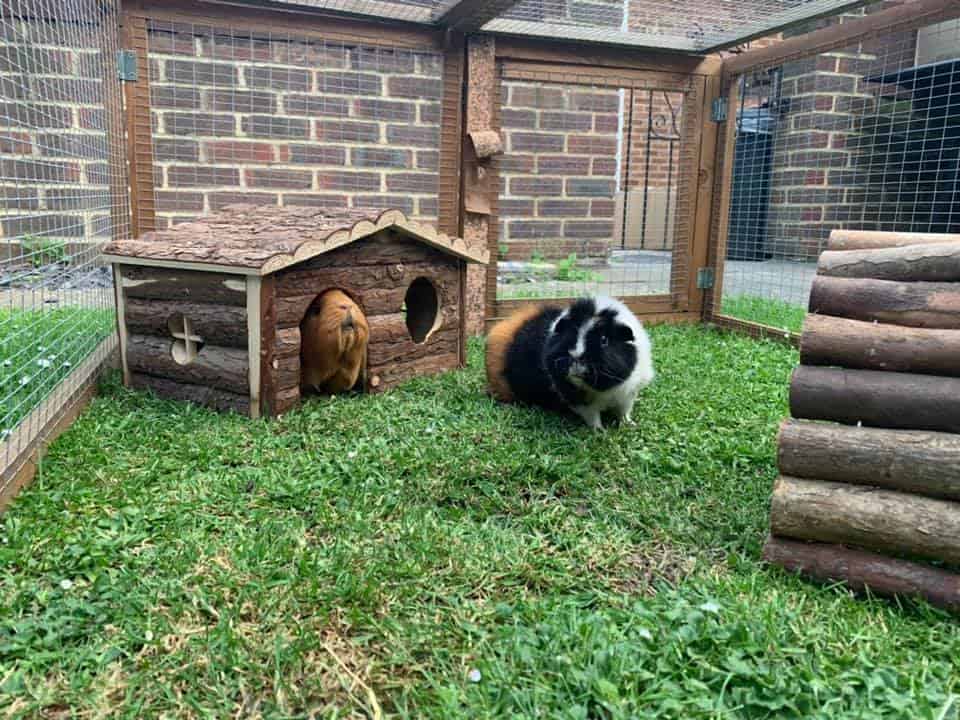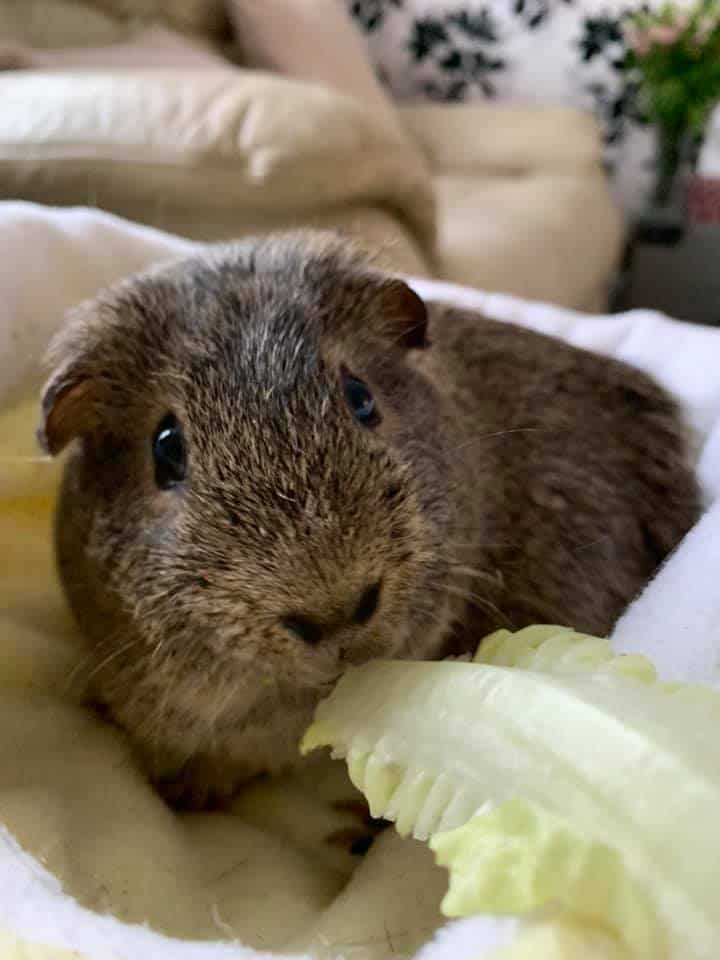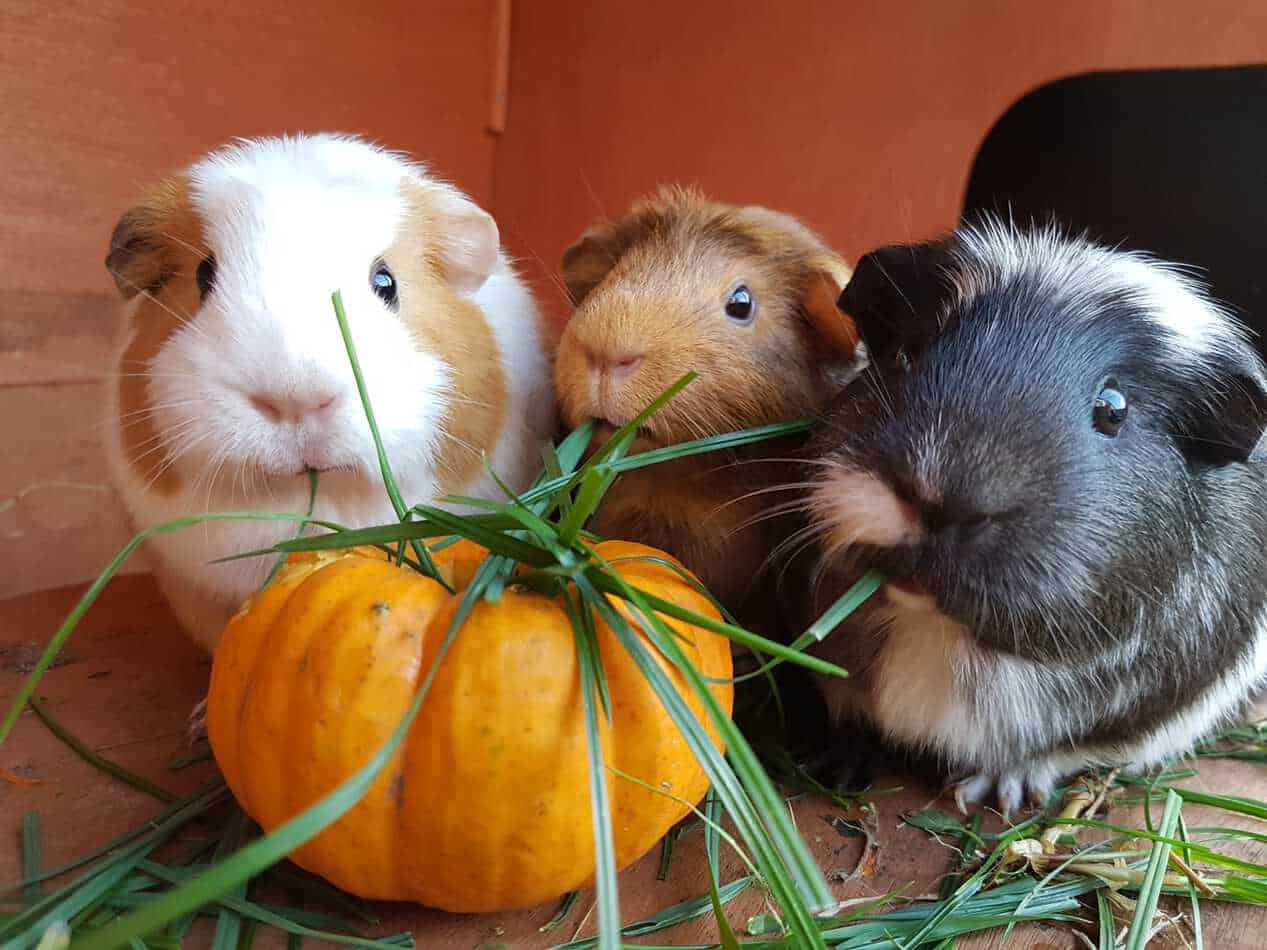Guinea pigs are known for their delightful squeaks and squeals, but what do those sounds mean? From happy sounds to popcorning, guinea pigs have a way of communicating that is entirely their own.
What sounds do guinea pigs make? Guinea pigs make a variety of sounds, including whistling, which usually indicates happiness, as well as purring. They may rumble to show their dominance and shriek when frightened.
Guinea pigs communicate with each other and with you through a series of whistles and squeals. When they’re happy, they may also hop around, which is known as popcorning.
When your guinea pig is upset or scared, he can also communicate with you. They rumble to show their dominance towards another guinea pig, while they purr when they’re happy and being cuddled.
Guinea pigs also communicate through chemical messengers, by scent marking. They can also urinate on things to mark them as theirs.
Do Guinea Pigs Make Noises?
Guinea pigs make a series of noises to communicate with you and other guinea pigs. Understanding these sounds can help you have a better relationship with your guinea pig.
Many times, your guinea pig will make gestures at the same time that they are making sounds, and this can help you determine what they’re trying to say. A grumble that occurs at the same time as your pig flashing its teeth can be an act of dominance.
Guinea pigs may also go about their day making small sounds, like grunts and squeaks. These sounds are typically normal and are just your guinea pigs way of communicating with the other pigs in its environment.
The most common sound you will hear your guinea pig to make is likely to be a series of high pitch squeezes. These squeezes usually indicate that they are excited. They like to make these squeezes during feeding or playtime.
What Sounds Do Guinea Pigs Make?
Guinea pigs make a series of different sounds that are associated with different behaviors and feelings. Your guinea pig makes these sounds to let you and the other guinea pigs around it know how it is feeling, such as happy or irritated.
- Wheeking/Whistling: This common sound made by your guinea pig typically relays their excitement or that they are anticipating something. They often make a high pitch squeaking sound and It is often associated with feeding or playtime, such as when your guinea pig sees you reach for the food container (usually means they want some) It is a loud whistle or squeal.
- Purring: Guinea pigs purr to express their contentment and their annoyance. Guinea pigs that are relaxed and calm letting out a deep purr are generally happy and comfortable. If they emit a higher-pitched purr that is louder at the end and are tense, they are likely annoyed. Some guinea pigs will also purr when they are scared or uncertain about something.
- Teeth Chattering: When your guinea pig chatters its teeth, it is saying to back away or stay away. Your guinea pig will often show its teeth in a yawning-type movement when making the sound.
- Rumbling: Rumbling is a sound that tends to be deeper than a purr. You may see your guinea pig dance at the same time, as this is usually made when one of your guinea pigs is trying to romance the other.
- Hissing: This is another sound that indicates your guinea pig is upset, similar to teeth chattering.
- Cooing: Cooing is generally a sound made by mother guinea pigs to her young. It is a sound intended to reassure and comfort them.
- Shrieking: This is a sound of an alarm and is a high-pitched shriek or squeak. It can indicate pain or fear.
- Whining: This moaning, whining sound indicates that your guinea pig is annoyed or does not like something that is being done.
- Chirping: This is a regular sound guinea pigs make, but it is not understood why they make the sound. This sound occurs in some instances when a guinea pig has lost its partner.
The video below does a great job at showing all the different sounds guinea pigs make with video/audio examples.
Guinea Pig Body Language
Like with the sounds they make guinea pigs also communicate with body language, just like people and other animals. These movements can indicate happiness or excitement, as well as annoyance or fear.
- Popcorning: When your guinea pig is popcorning, it means that they are hopping up and down (like popcorn popping). Younger guinea pigs do it more commonly than older pigs and tend to hop up and down higher than older pigs. Your guinea pig may do this when excited or happy or just because.
- Freezing: When you guinea pig freezes, they remain motionless. This can occur when they are startled or scared.
- Sniffing: Guinea pigs sniff to get to know the area around them and to interact with other guinea pigs. Areas they commonly sniff include the chin, nose, ears, and hind end of other guinea pigs.
- Touching Noses: When guinea pigs touch noses, they are greeting each other in a friendly way.
- Strutting: When your guinea pig moves around on stiff legs, it could be attempting a mating dance with another guinea pig. If it is chattering its teeth though, it is likely a sign of aggression.
- Other Aggressive Actions: If your guinea pig is holding its head up or rearing up on its hind legs, especially when accompanied by strutting, teeth chattering, or yawning, it may be a sign that your guinea pigs are about to fight. Guinea pigs also exhibit hair fluffing when they are upset at another guinea pig.
- Mounting: Mounting is commonly associated with mating or is a dominance behavior, especially when it occurs between two females.
- Scent Marking: Guinea pigs will mark their scent on things to identify them as their own, such as rubbing their chin or rear end on the items. They may even urinate on objects or other guinea pigs to mark their dominance.
- Tossing Head in the Air: Guinea pigs will toss their head back as a sign of agitation. This behavior occurs most commonly when they are held and want to be put down.
- Fidgeting: If your guinea pig fidgets while being held, it may be exhibiting this behavior because it wants to be put down. It can also be a sign that your pig needs to urinate or defecate.
- Licking: Guinea pigs will sometimes lick. It is unknown if this is a sign of affection or merely a way for your guinea pig to get salt from your skin.
- Running Away: When guinea pigs are nervous, one of their defense mechanisms is to run away from being held. Give your pig time to get used to you and most will stop trying to hide and evade you.
How Do Guinea Pigs Communicate With Other Guinea Pigs?
Guinea pigs tend to do best with other guinea pigs as they are social creatures and communicate commonly with each other. They communicate with other guinea pigs through a series of vocalizations and behaviors. They will exhibit certain behaviors if they are happy or excited, such as squealing and popcorning.
Guinea pigs may also demonstrate to other guinea pigs that they are frustrated or annoyed, such as by yawning or teeth chattering.
Your guinea pig may also demonstrate its dominance over other pigs in the cage. This can take the form of urinating on the other guinea pig or mounting it.
Guinea pigs also communicate via scent marking. They may mark their territory by rubbing their chins or faces on things that they want to mark as theirs. They may also urinate on things that they want to mark or on other guinea pigs to mark their dominance.
How Do Guinea Pigs Communicate With Humans?
Guinea pigs communicate with humans largely through vocalizations and other sounds, although they do have some behaviors to let us know that they are happy or bothered by something.
Wheeking and purring are two common vocalizations that guinea pigs do to let people know that they are happy or excited. At the same time, you might see your guinea pig popcorn, or hop up and down, while it is wheeking.
Your guinea pig may fidget when it is tired of being held or toss its head back. Some guinea pigs will also freeze or run away when they are in an uncomfortable situation that startles them or makes them nervous, such as being held if they are not used to it.
To learn more about how to coomunicate with your guinea pig, animals.mom.com has an article on how to communicate with a guinea pig.
What Noises Do They Make When They Are Happy?
Guinea pigs make a variety of sounds when they are happy or contented. They also exhibit different behaviors to go along with those noises when they are happy, such as popcorning, where they hop up and down with excitement.
A major sound that guinea pigs make when they are happy is known as wheeking. This is a happy squeal or whistle that can be quite loud and typically occurs when they are happy to see someone or if your guinea pig sees you go to the fridge to get your pig fresh fruits or veggies.
Guinea pigs will also purr when they are happy or contented. They can also purr when they are annoyed, so you have to read their body language: a happy guinea pig is relaxed and calm.
Guinea pigs will coo to each other when they are happy or contented, especially in the case of mothers with their young. It can be a reassuring sound to the other guinea pigs.
When guinea pigs are happy, they interact in a friendly manner with each other, such as touching noses with each other in a friendly greeting.
When guinea pigs are unhappy, they may be more irritable and exhibit signs of stress. They are often more likely to get sick and have health issues.
How Do Guinea Pigs Show They Are Scared?
Guinea pigs exhibit a range of sounds and expressions when they are nervous or scared. From running away to freezing in place, as well as the sounds they express, you can tell when your guinea pig is nervous or scared.
When guinea pigs are upset, they may chatter their teeth, which can often be accompanied by a yawning behavior while they make the sound. This vocalization typically means that they want you or other guinea pigs to stay away.
At the same time as making teeth chattering noises, your guinea pig may hiss when frightened or upset. This sound can be very like a cat hissing.
If your guinea pig gets scared or hurt, it might make a high pitched shrieking sound. This alarming sound should be investigated immediately as your guinea pig could be injured or maybe threatened by something.
If your guinea pig gets startled, you may find that it freezes. They will remain motionless when they are scared.
On the other hand, when your guinea pig gets scared, it may do the opposite of freezing and instead run away. This can occur when something frightens them or if they don’t want to be handled by you. Often they will run away and hide in an enclosed area such as a box or hide behind something in their cage.
When threatened, your guinea pig may show aggressive signs, such as strutting or rearing up on its back legs. They may also chatter their teeth or yawn to exhibit their worry or displeasure.
Your guinea pig may also toss its head in the air when it is in an uncomfortable situation. Your guinea pig may also fidget when it is being held or nervous; this can also be a sign that it needs to eliminate, so you should leave your guinea pig be for a little while.
Signs Your Guinea Pigs Are Angry
Guinea pigs are very happy and any unhappiness or angry doesn’t usually last long. They are prey animals and will tend to flee if they have the chance.
When they do get angry they may start to threaten another guinea pig, so it is important to know the signs when your guinea pig is experiencing unhappiness or anger.
Teeth chatterings is a common sign of an angry guinea pig and is a warning sign they will make when they want you or another guinea pig to back off.
Purring can also be another sign if they are angry. They might make a purring sound when they are happy or excited. They will commonly make this sound during feeding or playtime, but they will also make this sound when they are unhappy or angry and as an indication of stress.
When they fight they will try to become more dominant over another guinea pig by chasing them and touching their butt. if your guinea pigs start to fight it is best to separate them and then try to reinduce them to each other in a day or two when everything has cooled off.
Hissing or showing their teeth is another sign they are happy or angry.
Tossing their head/neck in the air is anther sign and they are trying to appear bigger than the other guinea pigs.
Flur puffing is something else guinea pigs will do to appear bigger, although it may look really sweet/cute to a human it is supposed to be a warning sign towards other guinea pigs and suppose to scare them off.
Want to learn more about facts about guinea pigs? Vetstreet.com have some guinea pig facts that may surprise you.
Related Questions:
What does it mean when a guinea pig vibrates? If your guinea pig vibrates, it is likely purring. This sound indicates that they are contented and happy and is a good sign.
Do guinea pigs recognize their owners? Guinea pigs are social animals and can recognize their owners, interacting with them and often exhibiting happy behaviors, especially when they have had positive interactions with their owners.
What does it mean when a guinea pig squeaks when you pet it? When a guinea pig gets petted and lets out a squeak, it is often happy, especially when accompanied by other activities such as purring. Your pig may squeal though when scared or hurt.





